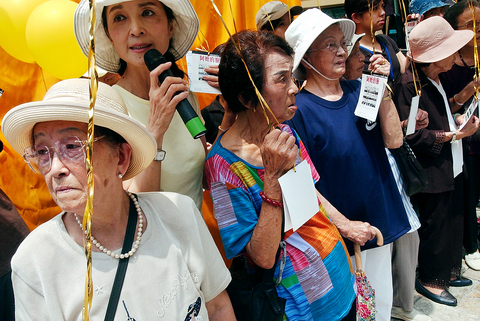Asia commemorated the 60th anniversary of Japan's World War II surrender yesterday by honoring the dead and searching for reconciliation, while Japan's leader tried to salve wounds by apologizing for the "great damages and pain" it inflicted on its neighbors.
With ceremonies and protests, the region memorialized the end to a conflict that killed millions of soldiers and civilians from the jungles of Burma to the glistening beaches of the Pacific and the sprawling cities of Japan and Korea.
Anger mixed with sorrow amid rekindled tension between Tokyo and the countries its Imperial Army invaded decades ago.

PHOTO: AP
Japanese Prime Minister Junichiro Koizumi expressed "deep reflections and heartfelt apology" for Tokyo's wartime colonization and pledged that his country would never forget the "terrible lessons" of the war, which ended Aug. 15, 1945.
"Our country has caused great damage and pain to people in many countries, especially our Asian neighbors, through colonization and invasion," Koizumi said in a statement. At a ceremony shortly thereafter, Koizumi and Emperor Akihito -- son of wartime Emperor Hirohito -- bowed before an alter of chrysanthemums at a nationally televised service for the nation's estimated 3 million war dead.
Japan's relations with some of its Asian neighbors are at the lowest point in years in part because of disputes about whether Japan has properly atoned for its past aggressions. The issue has contributed to opposition to Tokyo's bid for a permanent UN Security Council seat.
Fueling the grievances are Koizumi's controversial visits to Tokyo's Yasukuni shrine and his government's approval of history textbooks that critics say whitewash wartime atrocities such as the Rape of Nanking, in which Japanese troops massacred as many as 300,000 people while taking the Chinese city in 1937.
Tensions have also been stoked by disputes between Tokyo, Beijing, Taipei and Seoul over resource-rich islands off their coasts, and Japan's running argument with China over gas drilling in a contested area of the East China Sea. Concerns over communist North Korea's nuclear weapons program have also increased regional friction.
Protesters in Hong Kong, which Japan occupied from 1941-1945, marched on Tokyo's consulate yesterday, saying Japan had not sufficiently atoned for military aggression and chanting "Japan's hands are full of fresh blood." Scores of police meanwhile guarded Japan's Beijing embassy as China marked the anniversary demanding that Japanese leaders face up to suffering inflicted by their nation.
"Only with an honest attitude towards history can a nation win reconciliation and then integrate into the global community," the China Daily newspaper said. State television devoted the first 10 minutes of its midday news yesterday to war commemorations, showing battle scenes and the bodies of Chinese killed by Japanese troops.

DAREDEVIL: Honnold said it had always been a dream of his to climb Taipei 101, while a Netflix producer said the skyscraper was ‘a real icon of this country’ US climber Alex Honnold yesterday took on Taiwan’s tallest building, becoming the first person to scale Taipei 101 without a rope, harness or safety net. Hundreds of spectators gathered at the base of the 101-story skyscraper to watch Honnold, 40, embark on his daredevil feat, which was also broadcast live on Netflix. Dressed in a red T-shirt and yellow custom-made climbing shoes, Honnold swiftly moved up the southeast face of the glass and steel building. At one point, he stepped onto a platform midway up to wave down at fans and onlookers who were taking photos. People watching from inside

MAKING WAVES: China’s maritime militia could become a nontraditional threat in war, clogging up shipping lanes to prevent US or Japanese intervention, a report said About 1,900 Chinese ships flying flags of convenience and fishing vessels that participated in China’s military exercises around Taiwan last month and in January last year have been listed for monitoring, Coast Guard Administration (CGA) Deputy Director-General Hsieh Ching-chin (謝慶欽) said yesterday. Following amendments to the Commercial Port Act (商港法) and the Law of Ships (船舶法) last month, the CGA can designate possible berthing areas or deny ports of call for vessels suspected of loitering around areas where undersea cables can be accessed, Oceans Affairs Council Minister Kuan Bi-ling (管碧玲) said. The list of suspected ships, originally 300, had risen to about

A Vietnamese migrant worker yesterday won NT$12 million (US$379,627) on a Lunar New Year scratch card in Kaohsiung as part of Taiwan Lottery Co’s (台灣彩券) “NT$12 Million Grand Fortune” (1200萬大吉利) game. The man was the first top-prize winner of the new game launched on Jan. 6 to mark the Lunar New Year. Three Vietnamese migrant workers visited a Taiwan Lottery shop on Xinyue Street in Kaohsiung’s Gangshan District (崗山), a store representative said. The player bought multiple tickets and, after winning nothing, held the final lottery ticket in one hand and rubbed the store’s statue of the Maitreya Buddha’s belly with the other,

Japan’s strategic alliance with the US would collapse if Tokyo were to turn away from a conflict in Taiwan, Japanese Prime Minister Sanae Takaichi said yesterday, but distanced herself from previous comments that suggested a possible military response in such an event. Takaichi expressed her latest views on a nationally broadcast TV program late on Monday, where an opposition party leader criticized her for igniting tensions with China with the earlier remarks. Ties between Japan and China have sunk to the worst level in years after Takaichi said in November that a hypothetical Chinese attack on Taiwan could bring about a Japanese